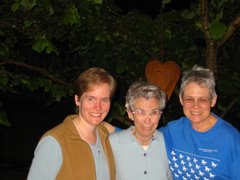Others have blogged about this video, and now that I have watched it, I must blog about it, too. You should watch it. It made me laugh, and then smile, and then cry (in a good way). It's hokey and sweet, and it makes the point that the most serious place on earth really is the Demilitarized Zone in Korea. And that you don't have to dance well - you just have to dance.
Ooh, was that lightening??! Be still, my beating heart! Something to write home about. Hmm. Guess not.
Sunday, June 29, 2008
Friday, June 27, 2008
Another Book Review
 Sanditon: Jane Austen's Last Novel Completed by Jane Austen
Sanditon: Jane Austen's Last Novel Completed by Jane AustenMy review
rating: 3 of 5 stars
This book was by Jane Austen and "Another Lady," mostly by the other lady. The first 11 chapters were by Austen, mostly, and it was obvious. By the end of the 11th chapter, though, there was no real indication of where the plot would go, except for using other Austen novels as a guide (seems reasonable), so most of the plot is by the other lady, as well. It is pretty much a published piece of fan fiction. Not bad fan fiction, but not great fan fiction, either, and not even close to the author it is meant to honor. That said, I enjoyed reading it, once I decided not to hold the bulk of the book up to Austen's level.
One thing the book did for me is to cast into fairly sharp relief those qualities of Jane Austen's novels that I like: the language, the social criticism and commentary, the character development, and the multi-dimensionality of the book's structure, among other features. This book had the language and the groundwork for the social commentary in the first eleven chapters, but those were short chapters and there was no room for character development or multiple dimensions. By the end of the 11th chapter, we knew very little about the apparent heroine, and the supposed hero had been mentioned once (and so maybe they were not the hero and heroine, after all!). The rest of the book is high on personal criticism, but is one-dimensional and is missing the social commentary, language, and character development. Another Lady tells us repeatedly about the selfishness of certain characters, practically rubs our faces with it, in a way that Jane Austen would never have done. Another Lady tried to capture Austen's language and the contemplative tone that most of her books have, but she didn't succeed. Still, it was fun and not actively painful. Plus, with two elopements on the same day, it's hard to complain.
View all my reviews.
Saturday, June 14, 2008
Book Review
 The Math Gene: How Mathematical Thinking Evolved & Why Numbers Are Like Gossip by Keith Devlin
The Math Gene: How Mathematical Thinking Evolved & Why Numbers Are Like Gossip by Keith DevlinMy review
rating: 2 of 5 stars
Devlin gives a hypothesis about how mathematical thinking evolved. He claims that the capacity for mathematical thinking is the same as the capacity for language (i.e., syntax), since syntactical thinking allows us to think "off-line" about objects, concepts, plans that are not in our immediate environment. Off-line thinking may be stimulated by non-environmental cues (e.g., thoughts), whereas on-line thinking is always stimulated by the immediate environment. Off-line thinking allows us to think about abstract ideas or objects, necessary for mathematical thinking.
Devlin also claims that doing math is like watching (or creating) a soap opera - it is all about relationships, but between mathematical objects instead of people. He likens mathematics to gossip.
Devlin's theories sound plausible to me, and it certainly seems that language and abstract thinking are related. It is interesting to read someone's ideas of exactly how they might be related. He gets into linguistics and archeology, too. It is also good to see someone describe, or attempt to describe, mathematical thinking for people who dislike or simply don't do math. I think this would be a worthwhile book for teachers of school math (arithmetic especially), since Devlin describes why arithmetic is difficult (his theory) and how it differs from true math. Anyone interested in math education should read it since it relates math to language and gossip, etc. Lots of good information, or at least some interesting ideas.
I don't like the way the book is written, however, neither the organization nor the writing style. For a mathematician, Devlin does not produce a neat, clean argument, although all the pieces may be there. He spends too much time saying what he will say and what he has said, and drags out what he says with extra words. Not concise. Maybe his publisher or editor wanted a long book. If one can get past the writing, organization, and repeated plugs for his other books, though, one will find an interesting, worthwhile theory.
View all my reviews.
Subscribe to:
Posts (Atom)

